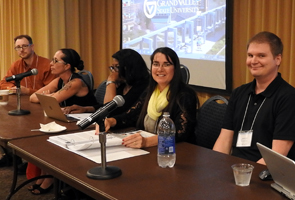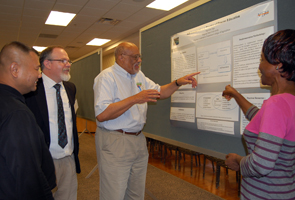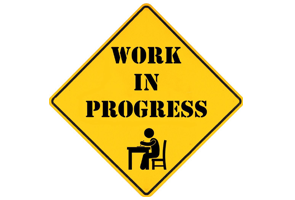Call for Proposals

This is the 12th annual Process Education Conference organized by the Academy of Process Educators. This year the conference is going to be cosponsored by University of South Alabama CoTL and combined with their 9th annual conference. The goal of these conferences is to share teaching/learning practices that support active learning and student-centered practices in higher education, to disseminate educational research on the impact of these practices, and to stimulate collaboration among a growing, interdisciplinary, and diverse community of educators committed to Process Education principles. The first link below is the call for proposals describing opportunities for contributing your research or practice. The second link is where you will submit your proposal. Select proposals (papers) may be invited for publication in the International Journal of Process Education. (Conference Co-Chairs: Steve Beyerlein & Dan Apple)

 |
Workshops (Scholarship Oriented)
These workshops are 90-minute explorations of current scholarship with an eye to advancing pertinent research (additional projects, collaboration, and publications).
Submission Guidelines
All proposals must be submitted through the conference submission portal and will include:
-
Author details
-
Type of presentation (Symposia, Workshop- Practitioner Oriented, Workshop- Scholarship Oriented, Poster, Research Paper)
-
Mode of delivery (Face-to-Face, online)
-
Title of presentation
-
Topic Area (Universal/Curriculum Design, Online Technology, Learner Empowerment, Collaborative Learning, Innovations in Learning, Programs/Efforts to increase Engagement/Success)
-
Abstract/Description of the Submission (100-150 words)
Evaluation criteria for all submissions include:
-
Topic impacts Scholarship of Teaching and Learning or educational practices
-
Topic aligns and supports the conference themes/goals
WORKSHOP- SCHOLARSHIP ORIENTED
Scholarship-oriented workshops are intended to stimulate a research mindset across all Academy members and to expand Academy research program. Workshops will be offered for up to fifty participants in a room that can accommodate six to eight participants per table. Submitted proposals for these workshops need to articulate what type of research activity the participants will be doing.
Submitted materials should include:
-
100-150 word abstract
-
description of research/learning outcomes
-
one page description of the research program that the workshop activity supports
-
bibliography of literature that is leveraged in the workshop
-
outline of research activity, including inquiry questions to be investigated
-
description of opportunities for collaboration that could come out of this research activity
*Upload to the submission portal in a single pdf.
Additional evaluation criteria for scholarship-oriented workshops
-
Research activity is scoped appropriately for 90 minutes
-
Meaningful results or enhanced research practice by participants
-
Participants will realize new scholarship opportunities
-
Workshop results that align with Academy research program
Workshops (Practitioner Oriented)
These 90-minute workshops model some aspect of Process Education practice by presenting an active learning experience that can be transferred or adapted to participants’ campuses. The workshop experience should model PE principles and be explicitly designed so that participants can facilitate a similar workshop on their own campuses.
Submission GuidelinesAll proposals must be submitted
through the conference submission portal and will
include:
- Author details
- Type of presentation
(Symposia, Workshop- Practitioner Oriented, Workshop-
Scholarship Oriented, Poster, Research Paper) - Mode of delivery (Face-to-Face, online)
- Title of presentation
- Topic Area (Universal/Curriculum Design, Online
Technology, Learner Empowerment,
Collaborative Learning, Innovations in Learning, Programs/Efforts to increase
Engagement/Success) - Abstract/Description of the Submission (100-150 words)
Evaluation criteria for all submissions include:
- Topic impacts Scholarship of Teaching and Learning or educational practices
- Topic aligns and supports the conference themes/goals
WORKSHOP- PRACTITIONER ORIENTED
Organizers are
looking for 90 minute professional development workshops
that model transformational learning of teaching/learning
practices. Workshops should be able accommodate up to
fifty participants in a room with six to eight
participants per table. Workshop proposals need to
articulate transformational learning outcomes and model
the practices being conveyed.
Submitted materials should include:
- 100-150 word abstract of the workshop
- transformational learning outcomes
- facilitation plan for the workshop
- description of previous experience doing faculty development
*Upload to the submission portal in a single pdf.
Additional evaluation criteria for practitioner workshops:
- Workshop outcomes are specified and can be met within time available
- Innovative practices and techniques are clearly articulated
- Facilitation plan should include
sufficient documentation on how this workshop
can be replicated by others - Prior experience of the workshop facilitator(s) in doing faculty development

Symposia
As an innovation in 2019, the Conference will offer a 90-minute venue for a group to come together and design a symposium to address an aspect of Reaching all Learners: Universal Design and Engagement. These sessions will take place on the final day of the Conference and should assist in bringing closure to the conference experience.
All proposals must be submitted
through the conference submission portal and will
include:
- Author details
- Mode of delivery (Face-to-Face, online)
- Title of presentation
- Topic Area (Universal/Curriculum
Design, Online Technology, Learner Empowerment,
Collaborative Learning, Innovations in Learning, Programs/Efforts to increase
Engagement/Success) - Abstract/Description of the Submission (100-150 words)
Evaluation criteria for all submissions include:
- Topic impacts Scholarship of Teaching and Learning or educational practices
- Topic aligns and supports the conference themes/goals
Submission materials should include:
- 100-150 word abstract
- description of the forum in which the Symposium will occur
- profiles of the lead and supporting personnel involved in the Symposium
- list of transformational outcomes envisioned for the Symposium
- schedule of Symposium activities
*Upload to the submission portal in a single pdf.
Additional criteria for symposia:
- Importance of particular practice focus
- Does it have diverse multiple perspectives
- Effective closure for conference participants
- Supports ongoing efforts by the Academy or challenges the Academy to expand its mission
- Expertise of the Symposium team

Poster Session
Create posters that represent a key innovation in universal design to share with conference participants. Each poster session presenter will interact with the conference attendees for 45 minutes to discuss their innovation/idea.
All proposals must be submitted through the conference submission
portal and will
include:
- Author details
- Type of
presentation (Symposia, Workshop- Practitioner Oriented, Workshop-
Scholarship Oriented, Poster, Research Paper) - Mode of delivery (Face-to-Face, online)
- Title of presentation
- Topic Area
(Universal/Curriculum Design, Online Technology, Learner
Empowerment,
Collaborative Learning, Innovations in Learning, Programs/Efforts to increase
Engagement/Success) - Abstract/Description of the Submission (100-150 words)
Evaluation criteria for all submissions include:
- Topic impacts Scholarship of Teaching and Learning or educational practices
- Topic aligns and supports the conference themes/goals
POSTER
The Poster Sessions at the Process Education Conference are a venue for sharing specific innovations that apply certain principles of Process Education. Clearly identify your innovation, scholarship, work in progress, or institutional change to ensure it fits into the context of Process Education and the conference theme. You can prepare handouts or other resources for participants who visit your poster.
Submitted materials should include:
• 100-150 word abstract
• description of outcomes observed/expected regarding the innovation
*Upload to the submission portal in a single pdf.
Additional criteria for posters:
• Shares innovation, scholarship, work in progress, or institutional change that
attracts participant interest and stimulates lively discussion
• Added value to the participants
• Relevance to conference theme

Research Paper
These discussion sessions will include a selection of three papers focused on a particular theme. Authors will present a 10-minute overview of their paper and then participate in a facilitated 60-minute discussion with session participants. (Conference participants will have already read the research papers.)
All proposals must be
submitted through the conference submission portal and
will
include:
-Author details
-Type of
presentation (Symposia, Workshop- Practitioner Oriented,
Workshop-
Scholarship Oriented, Poster, Research Paper)
-Mode of delivery (Face-to-Face, online)
-Title of
presentation
-Topic Area (Universal/Curriculum Design,
Online Technology, Learner Empowerment,
Collaborative
Learning, Innovations in Learning, Programs/Efforts to
increase
Engagement/Success)
-Abstract/Description
of the Submission (100-150 words)
Evaluation
criteria for all submissions include:
-Topic impacts
Scholarship of Teaching and Learning or educational
practices
-Topic aligns and supports the conference
themes/goals
Research Paper
Extended abstracts (targeted length of 1,000 words) submitted for peer-review need to address issues relevant to educational practices in a process education environment, must include the following elements:
- 100-150 word abstract (which can replicate the description of the presentation)
- Introduction section describing motivation, inquiry questions, and context for the work
- Methods section that explains the research approach, including a supporting figure/table
- Results/Conclusion sections commenting on the findings and their significance
- List of supporting references in APA format (word count not included)
*Upload to the submission portal in a single pdf.
Additional evaluation criteria for papers:
- Presentation Quality: clear, concise, self-contained, and follows guidelines
- Professional Scholarship: thesis, grounded in previous scholarship, evidence and significant findings
Full manuscripts will be requested based on peer-review of extended abstracts. Submitted manuscripts must include the following elements: (Max length limited to 4,000 words, 7 pages)
- 100-150 word abstract (which can replicate the description of the presentation)
- Introduction section describing motivation, inquiry questions, and context for the work
- Main body of the manuscript, divided into appropriate sections, where all figures and tables are in grayscale and embedded within the manuscript
- Conclusion or summary section following the main body
- List of references in APA format
- As appropriate, acknowledgments, appendices, and a glossary of words/symbols

Work-in-progress sessions
A thirty minute time period will be provided within a 90-minute session, where three like minded work-in-progress will be shared with participants. If you would like to propose a work-in-progress session, you need to provide a 2-page document highlighting what has been done, meaningful results, current issues being addressed, and future directions. This should be emailed to sbeyer@uidaho.edu. Proposals for work-in-progress sessions will automatically get accepted if the session supports the conference theme. You will be given 10 minutes to share information and then 10 minutes to share questions to seek audience feedback to guide future efforts. The final 10 minutes of the session will be allocated to audience-generated questions that should further deepen participant engagement. Work in Progress sessions will have a facilitator to guide the discussion through these phases.